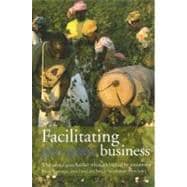
Note: Supplemental materials are not guaranteed with Rental or Used book purchases.
Purchase Benefits
Looking to rent a book? Rent Facilitating Pro-Poor Business : Why Advice Goes Further When It’s Backed by Investment [ISBN: 9789460221552] for the semester, quarter, and short term or search our site for other textbooks by Boomsma, Marije J.; Laven, Anna; Piters, Bart De Steenhuijsen. Renting a textbook can save you up to 90% from the cost of buying.
| Preface | p. 5 |
| What is this bulletin about? | p. 5 |
| Who is the bulletin for? | p. 5 |
| Parts of the bulletin | p. 6 |
| How was the book produced? | p. 9 |
| The writeshop process | p. 6 |
| Writeshop advantages | p. 7 |
| Facilitating pro-poor businesses | p. 9 |
| Introduction | p. 9 |
| The role of the facilitator | p. 9 |
| Changing position, responsibilities and challenges of actors involved in pro-poor businesses | p. 11 |
| Private sector | p. 11 |
| Producers and local traders | p. 14 |
| Public sector | p. 15 |
| Ngos and donors | p. 16 |
| Tensions between different actors | p. 16 |
| Bridging business and development - in practice | p. 19 |
| Sourcing ginger from Sierra Leone: no success without transparency and communication | p. 21 |
| Introduction | p. 21 |
| Reviving the ginger industry | p. 21 |
| Need for a full mandate | p. 25 |
| Inclusion of small producers | p. 25 |
| Communication and leadership is to be blamed | p. 26 |
| The future | p. 26 |
| Supporting sustainable tuna fishing in Ghana | p. 27 |
| Introduction | p. 27 |
| Starting a new partnership | p. 27 |
| Exploratory stage | p. 28 |
| KIT's evolving roles | p. 31 |
| Pro-poor impact ù more potential than facts so far | p. 32 |
| Achieving transparency | p. 33 |
| Organic Cocoa Dominican Republic S.A. | p. 35 |
| Introduction | p. 35 |
| The start-up process | p. 35 |
| KIT Reflections on changing roles | p. 38 |
| Pro-poor business vs. conventional business approaches | p. 38 |
| Processing biodiesel from jatropha with smallholders in Mali | p. 41 |
| Overview | p. 41 |
| How a biofuel business was born | p. 41 |
| Jarropha goes global | p. 42 |
| Overcoming constraints | p. 44 |
| KITs changing role | p. 45 |
| Designing for pro-poor impact | p. 45 |
| Towards good governance | p. 33 |
| Yiriwa SA: Setting up a trade house for organic products made in Mali | p. 47 |
| Introduction | p. 47 |
| Growing organic - responding to demand | p. 47 |
| KIT reflections | p. 49 |
| KITs changing role: from advisor to active shareholder | p. 53 |
| Seeking pro-poor impact | p. 54 |
| Governance | p. 55 |
| Facilitating pro-poor businesses: what have we learned? | p. 57 |
| Lessons from cases | p. 57 |
| Changing positions of pro-poor business partners | p. 59 |
| The involvement of a knowledge institute in pro-poor business | p. 60 |
| Contextualizing roles | p. 61 |
| Final reflections | p. 63 |
| Epilogue | p. 65 |
| Common problems with business plans | p. 67 |
| A local network in the South is crucial | p. 68 |
| Public funding is needed | p. 68 |
| New investments | p. 69 |
| The future | p. 69 |
| Resources | p. 71 |
| Table of Contents provided by Ingram. All Rights Reserved. |
The New copy of this book will include any supplemental materials advertised. Please check the title of the book to determine if it should include any access cards, study guides, lab manuals, CDs, etc.
The Used, Rental and eBook copies of this book are not guaranteed to include any supplemental materials. Typically, only the book itself is included. This is true even if the title states it includes any access cards, study guides, lab manuals, CDs, etc.